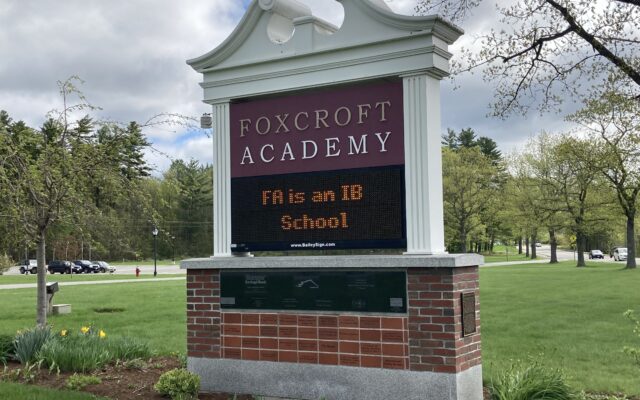
A visa pause threatens Maine schools that depend on international students
By Elizabeth Walztoni, Bangor Daily News Staff
In a typical spring, high school students from around the world — China, Vietnam, South Korea, Spain, Germany, Italy and many other countries — would be scheduling interview appointments for the visas they need to study in Maine.
This year, they can’t, and the rural high schools that have come to depend on them are worried.
The federal government stopped scheduling visas for international students in late May to expand vetting of their social media, days after revoking the visas of all international students at Harvard University. The pause is also affecting younger students, and schools are in the dark about what’s next or how to respond.
“The public discourse is this is a college thing, and it’s not,” said Jeff Burroughs, head of Lincoln Academy in Newcastle.
The pause comes as independent high schools in Maine are close to finally rebuilding international student populations that fell sharply during the pandemic. Over the past 15-plus years, many have relied on the tuition these students pay to keep the doors open in the face of declining local populations and state funding formulas that don’t cover the full cost of educating them.
As technology makes the world more connected, experience with peers from global backgrounds also becomes increasingly necessary to prepare local students for adulthood, according to administrators.
“When I graduated, my world was central Maine,” said Arnold Shorey, head of Foxcroft Academy in Dover-Foxcroft. “And that’s totally different for today’s student.”
Most programs have rolling admissions, so it’s hard to gauge the full effect of the visa pause before the start of the next school year. Some students are already accepted and have visas. Others may not apply until later in the summer.
But at least 10 new students have been accepted to Foxcroft and can’t get visa appointments. At Lincoln Academy, six were in that situation as of mid-June, about a third of a typical incoming international class size. Foxcroft’s international students make up around a quarter of its 400-plus enrollment. Lincoln aims for about 10 percent of its roughly 600 students to come from overseas.
The schools also worry existing students won’t be able to return.
It’s possible they won’t be cleared in time for the school year if the pause continues. Even if interviews are reinstated soon, Shorey said the pause has already done damage and likely created a backlog that will lead to more delays.
While it’s too early to say how budgets could be affected, schools are watching anxiously.
If enrollment at Foxcroft takes a serious hit, the school would look at cutting staff, according to Shorey. It’s already delaying summer projects, including work on its parking lot, because of budget concerns.
Maine high schools offering these programs typically charge tuition north of $30,000. International enrollment saved at least one school, Lee Academy in Springfield, from closing, according to past Bangor Daily News coverage, and it helps subsidize costs at other schools.
At their pre-pandemic peaks, Foxcroft Academy enrolled about 100 international students; Lincoln, around 60; and Bangor’s John Bapst Memorial High School, around 70. Each of those three schools is now about 10-15 students short of those numbers.
Maine doesn’t track international enrollment for younger students, but Burroughs estimates about 1,000 attend the state’s independent high schools, most of which receive tuitioned students from neighboring towns without public secondary schools. About 2,000 international students attended Maine colleges in 2024.
In addition to private high schools, the visa pause also affects students coming to summer camps, exchange programs and one-year studies in public high schools, Burroughs added. He feels teenagers are caught in the middle of a federal decision that wasn’t fully thought through.
“American education is an export,” Burroughs wrote to U.S. Sen. Susan Collins when the pause was announced in late May. “In some ways you can consider it one of the most important exports as it helps shape minds and educate students to appreciate American democracy, freedom of speech and our way of life as a country of immigrants.”
Some teenagers already in Maine are afraid to go home for the summer in case they can’t return when the fall semester starts, according to administrators. Others are unsure about coming to the U.S. even if they do get a visa, wondering if it will be revoked. Students from Spanish-speaking countries fear ICE raids.
Beyond travel restrictions, international students’ families are worried about an economic downturn, according to Jason O’Reilly, principal and academic dean of John Bapst. Many students also attend college in the U.S., meaning parents pay for many years of private school tuition. They send their children here because the education’s quality is worth the cost and Maine has a reputation for safety, he said, but other international schools could become more appealing.
The school is “planning conservatively” with its budget this year as a result, but finances are healthy enough that it won’t have to make cuts. O’Reilly also noted that the international program is a draw for Maine teenagers.
“For a lot of our day students, the international program is a huge factor in determining to enroll here,” he said. “The diversity we’re able to bring to the school, and the Bangor area, is unique.”
Even before the pandemic, schools were working “harder than ever” to recruit international students in the first Trump administration, when some families began to feel they weren’t welcome in the country, John Bapst’s former head, Mel McKay, told the Bangor Daily News in 2019.
Schools have added some advanced classes for international students and even expanded extracurriculars, as when Bapst increased the size of its school orchestra. Students make friends with their international classmates and sometimes go on to visit them in their home countries.
“They’re just like any other kid here, regardless of where they came from,” O’Reilly said.